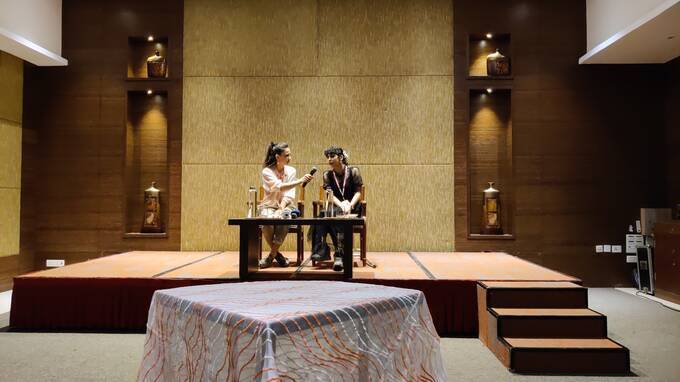

Excerpts from an interview with Kurdish film maker Lisa Calan, who bagged the Spirit of Cinema Award at the 26th International Film Festival of Kerala (IFFK).
Q. How did you find your passion for cinema? Any specific childhood memory you can think about?
During my childhood, while playing with friends, I always had a dream in my mind that I should create something of value. Growing up, I decided to follow that dream and it opened my way to Cinema. Considering my country’s current situation, I take cinema as a serious profession. I have to tell stories… not just my story, but my mother’s story, my people’s story… Each one is special and films enable me to express whatever I want. Cinema is the best way to serve my people.
Q. What is your opinion on the People’s Democratic Party (HDP) and the current political scenario in Turkey?
When the People’s Democratic Party was built, we only had ideologies. Now we are like a union, comprising film makers, artists, left groups and others, who unitedly stand for our rights. We fight together and strongly believe in achieving our dreams. The party has also brought a new dynamism in Turkey. All left groups and some rights groups have extended their support to us. Day by day, we are getting bigger and closer to our dreams. In every rally of the HDP, you can see all kinds of people with different ideologies. Many try to scare us, but we are not afraid and will always stand together.
Q. Do you think that the ISIS and Erdogan are in the same boat?
I am a victim of an ISIS terror attack. Hence, I know ISIS and I am fighting against it. But, I am no one to comment on anything going on between ISIS and any other particular group.
Q. Can you explain about the sufferings of Kurdish people in your country? Are they persecuted?
Of course. Kurdish people face a lot of deep problems in Turkey. It is like asking you not to take or drink water. We are forced to fight for our claims, our rights… women’s rights, children’s rights, education, language and many more.
There is an interesting dynamism in Kurdish people. We have been fighting this war for about 100 years and we definitely are tired. I really don’t understand how we fight again, but somehow we do it. Our ideology, our nation, gives us strength to move on. We don’t have any choice. But we tell them, “we are here, you can kill us if you want, but we are here”.

Q. What are your future projects?
Right now, I have plans for two projects in the near future. One, a film on terror attack survivors, showing their sacrifice and trauma. The other one is a film on my life, my autobiography. I lost my legs, but its only my legs, right? I want to show the story of Kurdish people, through mine. As a person, I am like half woman and half robot, still I came here, that is important for me and my people. I want to bring changes in my people’s lives and show the world that we are not just numbers, but people with dreams.
Q. The world is facing yet another war, the Russian invasion in Ukraine. What do you have to say about it?
In any war, all we see are leaders, ministers and government officials taking all the major decisions. The media often project them as heroes or legends. But that’s not true. When a war breaks out, the big people, they are only fighting with ideologies, whereas the real fighting happens among the common people. That’s entirely different. They lose their loved ones, they are forced to move from their homes and suffer a lot. I have gone through it and I know it. That should end.
Q. How are Kurdish people represented in Turkish cinema?
When you analyze the Turkish cinema in the past few years, it is clearly visible that Kurdish people are portrayed as bad people. They are shown living in villages and uprooted to cities. As a filmmaker, I wish to change this, and show Kurdish people’s reality. I wish to tell the audience that we are open to changes. The Turks stole our story and now we want to take it back.
However, the major hurdle is that as a Kurdish filmmaker, it is difficult to find money for films. We are currently a working collective and are making small movies and documentaries. But it needs further expansion.
Q. Since the attack, what was the biggest challenge you faced in your life? How did you find the strength to cope with it?
I can’t point out any one particular challenge. Every moment was painful. The attacks made me lose my legs and the treatments broke my bones. My strength to cope with the tragedy came through my acceptance of reality. I told my doctors, “I know the problem, I can’t walk. I accept it. Now, tell me the solution. Let me focus on that”.
Actually, in many ways I am thankful to the disaster that happened in my life. It made me realize that my life itself is a fight.
Q. Your film 'The Tongue of the mountains' shows the difficulties faced by a Kurdish child. Does it have any relation with your childhood?
It is not just the boy’s story, it’s my story. Not just my childhood, but the childhood of Kurdish people. They have been going through the very same problems for years. It has not ended and is still going on. The world should see it.